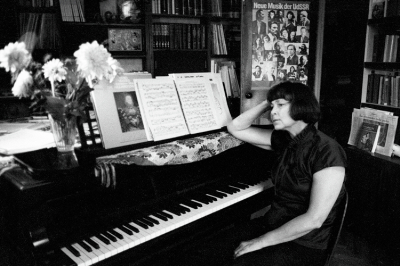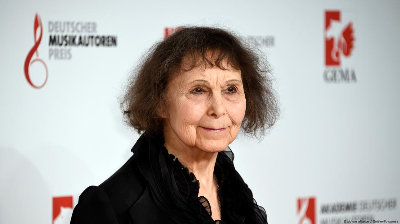
©
У віці 93 років у Німеччині, в містечку Аппен під Гамбургом у своєму будинку, померла одна з найвизначніших композиторок сучасності – Софія Губайдуліна - авторки понад сотні симфонічних і камерних творів, музики для театру та кіно. Народилася 1931 року в Татарстані, здобула музичну освіту в Казанській та Московській консерваторіях. Її творчість у СРСР зазнавала жорсткої критики і композиторку внесли до "чорного списку". Проте на Заході її талант знайшов визнання – зокрема, завдяки виконанню її скрипкового концерту Offertorium Гідоном Кремером у 1981 році. Вона стала однією з найвпливовіших постатей сучасної академічної музики поряд з Альфредом Шнітке та Едісоном Денисовим. Серед її найвидатніших творів – Сім слів для віолончелі, баяна та струнних, Радійте! для скрипки та віолончелі, Сонячний гімн (присвячений М. Ростроповичу), In Tempus Praesens для скрипки з оркестром, Zeitgestalten, а також монументальні духовні твори – Страсті за Іоанном та Воскресіння за Іоанном. Вона також створила музику до культових фільмів, зокрема Сходження, Чучело та мультфільму Мауглі. За життя Губайдуліна здобула широке міжнародне визнання: була лауреаткою Премії ім. Сібеліуса, Премії ім. Соннінга, Премії Кіото, Премії ім. Баха, а також Премії німецьких музичних авторів, де її назвали "найбільшим містиком сучасної класичної музики". Вона стала членкинею Берлінської академії мистецтв, Гамбурзької академії мистецтв та Французької академії витончених мистецтв. У 2018 році Губайдуліна була включена до складу Академії кінематографічних мистецтв і наук, яка вручає премію "Оскар". Смерть С. Губайдуліної викликала широкий резонанс у світі. Німецька преса назвала її "найбільшим містиком сучасної класичної музики", а її твори порівняли з "садами радості та печалі", що виростали з тиші й звуків. Композиторка вважала музику "священним актом" і черпала натхнення в глибокій вірі. Її спадщина живе в репертуарі провідних музикантів, а її ім'я назавжди вписане в історію світової музики.
Sofia Gubaidulina, Visionary Composer Blacklisted in the USSR, Dies at 93
Sofia Gubaidulina, one of the most significant composers of contemporary classical music, has passed away at the age of 93 in her home in Appen, near Hamburg, Germany. Gubaidulina, the author of over a hundred symphonic and chamber works, as well as music for theater and film, was born in 1931 in Tatarstan and trained at the Kazan and Moscow Conservatories. Her avant-garde approach, which defied Soviet artistic norms, led to her blacklisting in the USSR. However, her talent found recognition in the West—particularly after violinist Gidon Kremer’s landmark 1981 performance of her violin concerto Offertorium. She emerged as one of the most influential figures in modern classical music, alongside Alfred Schnittke and Edison Denisov. Among her most renowned compositions are Seven Words for cello, bayan, and strings; Rejoice! for violin and cello; The Canticle of the Sun, dedicated to Mstislav Rostropovich; In Tempus Praesens for violin and orchestra; Zeitgestalten; and her monumental sacred works The Passion According to St. John and The Resurrection According to St. John. She also composed music for acclaimed films, including The Ascent, Scarecrow, and the animated classic Mowgli. Throughout her life, Gubaidulina received widespread international recognition. She was awarded the Sibelius Prize, the Léonie Sonning Music Prize, the Kyoto Prize, and the Bach Prize, as well as the German Music Authors’ Award, where she was hailed as “the greatest mystic in contemporary classical music.” She was a member of the Berlin Academy of Arts, the Free Academy of Arts in Hamburg, and the French Academy of Fine Arts. In 2018, she was inducted into the Academy of Motion Picture Arts and Sciences, which presents the Academy Awards. Her passing has resonated deeply across the global cultural landscape. German media have described her as “the greatest mystic of contemporary classical music,” while critics have compared her compositions to “gardens of joy and sorrow, cultivated from silence and sound.” Gubaidulina viewed music as a sacred act, drawing profound inspiration from her faith. Her legacy endures in the repertoires of the world’s leading musicians, ensuring that her name remains etched in the annals of musical history.

©
1070